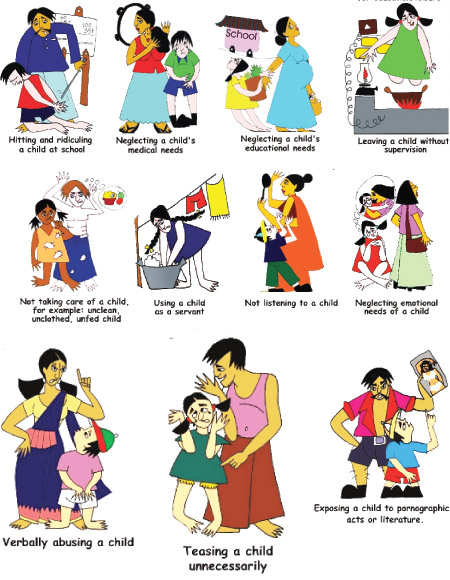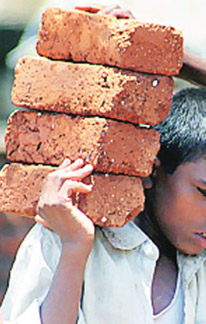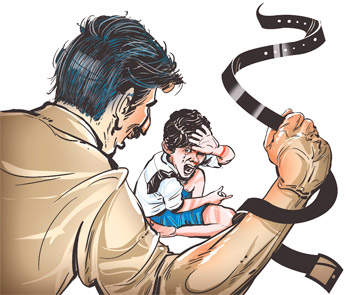|
Child Protection: Action Plan to focus on abuse
prevention:
'Parents should be more vigilant'
by Isuri Kaviratne
In a set up where children are not taken care of is and left to their
own devices is when they fall victim to abuse. This is the contention
expressed by parents, the police and other stakeholders.
 "What we want is for parents to look after their children. Children
are attacked when they go home after school, or while staying at home
alone when parents are at work. We want parents to be more aware,"
secretary to the Child Protection Committee, Chandrani Senaratne, who is
also the Secretary to the Ministry of Women's and Child Affairs said.
Acknowledging that it was a difficult task in the current economic
context, she however advocates parents to be more vigilant. "What we want is for parents to look after their children. Children
are attacked when they go home after school, or while staying at home
alone when parents are at work. We want parents to be more aware,"
secretary to the Child Protection Committee, Chandrani Senaratne, who is
also the Secretary to the Ministry of Women's and Child Affairs said.
Acknowledging that it was a difficult task in the current economic
context, she however advocates parents to be more vigilant.
The recent atrocity reported in the media was about a 13-year-old
girl being sexually abused by a hotelier in Matara. This is the latest
in a long list of crimes against children reported in Sri Lanka. The
murder of a four-year-old girl in September last year compelled the
government to set up a child protection committee comprising Ministers
Lakshman Kiriella and Sudarshini Fernandopulle.
We have beautiful, descriptive epithets describing the innocence of
children ' They are like flowers, they are the future of the world' and
many such. However, society often forgets that these innocent children
are voiceless and helpless thus making them also the most vulnerable.
Senaratne said an Action Plan prepared earlier this year has been
approved by Cabinet and will be implemented along with stakeholders-
the, Ministries of Education, Justice, Media and the Police.
"The Action Plan is focused on preventive methods," Senaratne said.
In addition to raising awareness among the public, the Action Plan
includes adding sex education to the school curriculum. Senaratne
explained that the current syllabus on sex education and reproductive
health was inadequate because it did not touch on the sensivities of the
subject and most teachers skipped this particular lesson, either out of
embarrasment or because they felt children were too young to be taught
the subject. Therefore, the whole picture needs to be looked into when
changing the school syllabus, she said.
A special programme will be launched in the rural areas to tackle the
issue, she said, where the police and members of the Civil Protection
Committee work closely with the communities to discuss their issues,
identify problems related to child abuse and take action to prevent
them. "What we mostly want is for parents to look after their children
properly. Children are attacked when they go home after school, or while
staying at home alone when the parents are at work.
We want parents to be more aware," Nadishani Perera, a consultant at
the NCPA said.
 Sajeeva Samaranayake, Deputy Chairman of the National Child
Protection Authority (NCPA) explained that protection for children comes
with a long list of requirements that the current system is lacking,
especially in a society where children do not go to police to lodge
complaints - hence the society doesn't know what the larger problem is.
"What we see today are several reported cases of abuse, but on a larger
scale, we don't know what type of abuse children go through, to supply
them with an adequate level of protection," he said. Sajeeva Samaranayake, Deputy Chairman of the National Child
Protection Authority (NCPA) explained that protection for children comes
with a long list of requirements that the current system is lacking,
especially in a society where children do not go to police to lodge
complaints - hence the society doesn't know what the larger problem is.
"What we see today are several reported cases of abuse, but on a larger
scale, we don't know what type of abuse children go through, to supply
them with an adequate level of protection," he said.
That is why the government and other stakeholders need better
understanding of the communities, feel their pulse and know what the
problem is. For that to happen, positive relationships need to be built
between the community and the government, so that the latter has the
right information to carry out prevention methods.
He said "Women and children were overlooked in our society when
carrying out assessments, that even during the recent natural disasters,
the Disaster Management Centre failed to include separate statistics on
women and children in their reports."
NCPA consultant Perera said that there wasn't enough statistics to
compare whether the number of abuse cases against children have
increased over time or not, though it is obvious that there are more
cases as published in the media.
The awareness programmes should be compelling enough to get people to
point out child abuses, she said. "There are more instances of that
happening, therefore, the current awareness programmes have achieved
something but it is not enough. What should be done is prevent the
abuse, not capture the culprit after the abuse," Perera said.
Strong networks should be built within communities with multiple
grassroots level activities to build the kind of protective environment
the children in our society need. This includes, she said, a complete
overhaul of the portrayal of men and women on television, objectifying
the female body and giving a wrong message to children that men need
violence to be heroes and women need to be submissive to be perfect.
"Children who grow up with these norms, one day become adults and accept
them as reality and little girls who see submissive women on TV, don't
speak of the violence inflicted upon them," she added.
NCPA deputy chairman Samaranayake said that there were far reaching
social, cultural and economic reasons that need time to assess and
address but there is no political interest in addressing these issues.
 Therefore, they remain unaddressed. Due to these social and economic
reasons, welfare systems do not directly deal with affected communities
victimizing them further, and as a result, giving the perpetrators a
platform to engage in abusive activities. Therefore, they remain unaddressed. Due to these social and economic
reasons, welfare systems do not directly deal with affected communities
victimizing them further, and as a result, giving the perpetrators a
platform to engage in abusive activities.
Clinical Psychiatrist Dr. Nayanananda Kumaranayake said that one
third of the High Court cases involve a child victim and 27% of all
court cases are related to some sort of violence against children. In
most instances, the crimes are committed by a person known to them.
In addition to social, economic and cultural reasons, society
overlooks what happens to these children when they grow up. "Most of
these abused children fail to lead a normal life, and have a tendency to
hurt themselves and/or commit suicide," he said.
Agreeing with Samaranayake, he said the welfare system lacks certain
elements when dealing with criminals and victims, Kumaranayake said
after the criminal justice system gives a verdict, the mental health
system does not take over to look at the mental health of the patient
and what compelled the criminal to engage in this kind of criminal
activity.
However, at the time of going to press Police data regarding these
issues was not available. |

